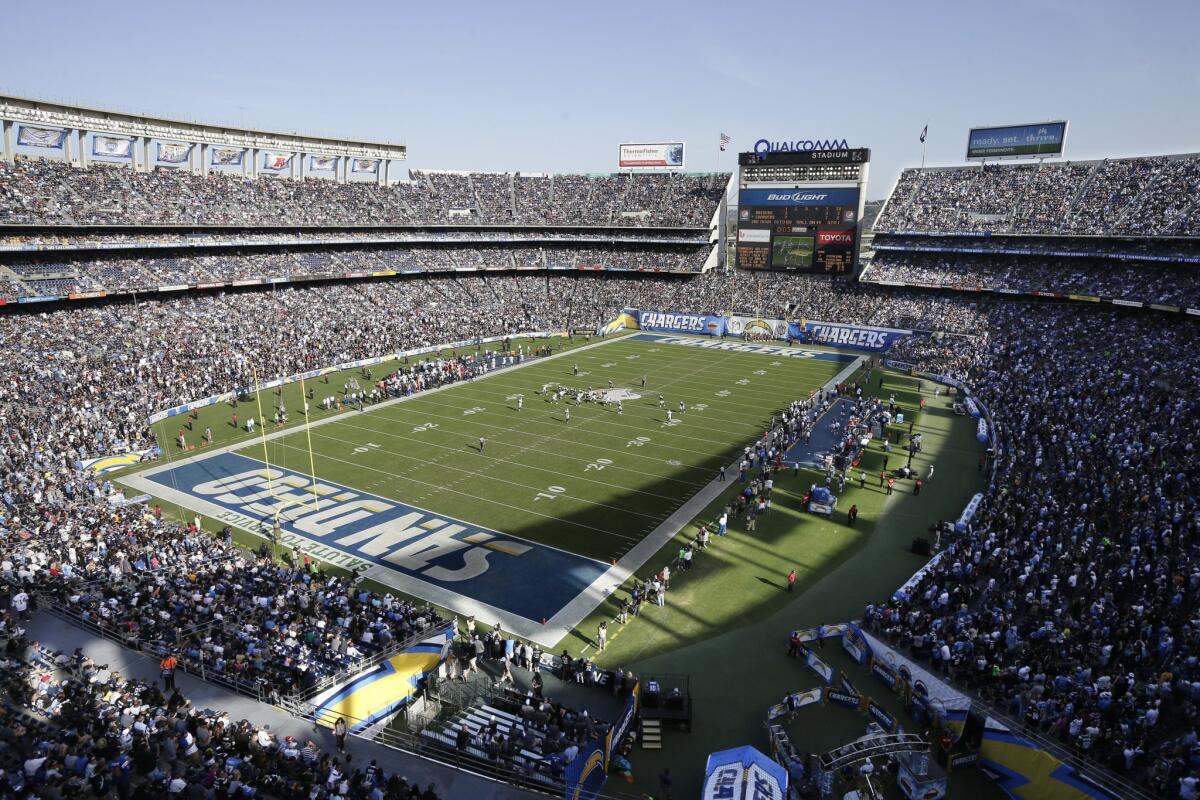Committee defends Mission Valley as site for proposed Chargers stadium

- Share via
Reporting from San Diego — A mayoral advisory committee assigned to find a place for a new Chargers stadium defended its selection Thursday of the Qualcomm Stadium site over the downtown site preferred by the team owners.
The 166-acre site in Mission Valley would make for a stadium that is $250 million cheaper and several years quicker to build, committee chairman Adam Day told a news conference in the Qualcomm parking lot. Among other advantages, he said, is that the site is already owned by the city.
Day said he and other committee members plan to meet soon in San Diego with NFL Commissioner Roger Goodell. To move from San Diego, the Chargers would need permission from the NFL.
The advisory committee — nine business and civic leaders appointed by Mayor Kevin Faulconer — will now shift its attention to finding a financing plan to build a new stadium and keep the Chargers from moving to Carson, where the team has announced plans to build a joint-use stadium with the rival Oakland Raiders.
“We wouldn‘t want to share the stadium with that other team,” said former Chargers star Shawne Merriman, in a tone of voice that suggested even mentioning the Raiders’ name is unpleasant.
Merriman is one of several former Chargers greats who have rallied behind Faulconer’s effort to keep the team from departing.
(As the press conference was underway in San Diego, a petition campaign began in Carson seeking to approve the stadium project there. The signature gathering campaign is funded by the Chargers.)
Day’s comments appeared to foreshadow the talking-points strategy to be used in seeking voter approval: that the project is not just a stadium for an NFL franchise but also a venue for other sporting and entertainment events, along with residential and commercial development in what is now just an enormous parking lot.
Committee member Mary Lydon, executive director of the Urban Land Institute for San Diego and Tijuana, envisioned a development that could become “one of San Diego’s crown jewels — a walkable community of homes, shops and restaurants, connected to a river park, mass transit and a multi-use stadium.”
Faulconer has given the committee until the end of May to present a financing plan. After taking the issue to the City Council, it could then be scheduled for the ballot.
In the team’s 14-year campaign for a new stadium, the Chargers once favored the Qualcomm site but, finding no support at City Hall, dropped that idea and instead proposed a stadium and convention center annex on a downtown site that is several blocks from the city’s waterfront convention center.
That proposal has never found favor at City Hall and was opposed by the politically powerful hotel industry that wants an expansion of the convention center that is contiguous to the current center.
The news conference brought dozens of fans who have called for officials to find a way to keep the Chargers.
“This is an issue of civic pride,” said Rafael Alvarez, who heads Bolt Pride, which boasts more than 9,000 members.
Twitter: @LATsandiego
More to Read
Go beyond the scoreboard
Get the latest on L.A.'s teams in the daily Sports Report newsletter.
You may occasionally receive promotional content from the Los Angeles Times.










